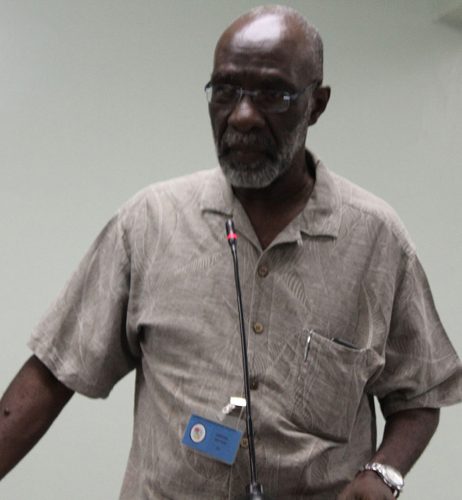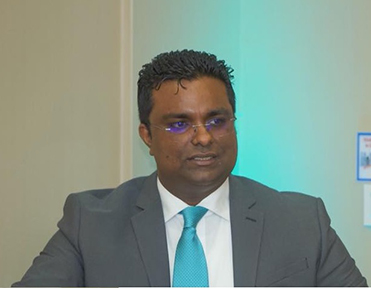As the clock for general elections continues to tick away, GECOM yesterday made no decisions about how long it will take to merge the information garnered from House to House (HtH) registration with the National Register of Registrants (NRR) nor has it decided a possible date instead the commission will meet again on Friday to discuss “proposals from the secretariat”
“Another wasted meeting… We are no way closer to the decisions of holding elections…We have failed to come to any meaningful decisions, but I can tell you that we are attempting this again on Friday”, opposition-nominated commissioner Sase Gunraj told reporters outside the commission’s headquarters yesterday.
According to Gunraj much of yesterday’s discussion was irrelevant to holding credible elections in a timely manner.

Last week GECOM chair, retired Justice Claudette Singh decided to truncate the controversial HtH registration process and “merge” the data collected with the National Register of Registrants Database (NRRD).
The exercise which ended on August 31 is said to have registered some 370,822 persons. It is not clear if any of the data collected during this process has been computerized. Opposition Leader Bharrat Jagdeo has claimed that all the data remains on “forms filled in by enumerators” while GECOM Public Relations Officer Yolanda Ward has told Stabroek News that staff has been working over the last three weeks to computerize and edit the data.
Ward has not been able to say how many staff members are involved in this process or how many entries have been completed.
Following a two-hour meeting yesterday, commissioners told the media that issues on the table include fingerprint cross-matching, the possible printing of National ID Cards and the creation of a voters list following the merger of data but no decision was made.
According to government-nominated commissioner Vincent Alexander the commission is still trying to settle “some principles”.
“Once those are settled we will define timelines based on proposals coming from the secretariat,” he explained.
His colleague Charles Corbin further indicated that the commission will be examining these proposals on Friday.
Yesterday, the commissioners discussed the report from Deputy Chief Election Officer Roxanne Myers and the commission’s Information Technology Manager who travelled to Jamaica to examine practices in data merging, cross-matching of fingerprints and verification.
As ID cards are not necessary for the holding of elections, Gunraj has described the discussion of their production as irrelevant.
We are hearing about the production of ID cards now, he said explaining that the secretariat has shared a minimum timeline of 92 days for the production of ID cards or a longer timeline of 140 days.
He noted that while these processes can occur concurrent with election preparations the proposals are all for “very, very lengthy processes” which would be conducted using “unverified data”
The opposition commissioner also lamented that claims and objections were not discussed at yesterday’s meeting.
Currently the commission is depending on the secretariat to provide a timeline for the possible merger of the house-to-house registration data and the registration database, as well as a timeline for an “extensive claims and objections exercise.”
It is only after this exercise is concluded and a list of electors produced that a date for elections is traditionally identified.
Under scrutiny
GECOM has recently been under scrutiny over its readiness to proceed with elections as a result of President David Granger holding to the position that it must advise him of readiness for the polls. The elections are due as a result of the National Assembly’s passage of a no-confidence motion against the government last December. The constitution requires that elections be held within three months of the passage of a no-confidence motion against government, unless an extension is granted by not less than two-thirds of the elected members of the National Assembly. However, legal challenges to the validity of the passage of the motion in part stalled preparations.
A new three-month period began on June 18 when the CCJ issued its ruling affirming the passage of the December 21, 2018 motion of no confidence, It should mean that elections be held by September 18 which date is no longer practicable and would therefore necessitate an extension of the period for elections by Parliament which would require the support of the opposition.
With no decision at yesterday’s meeting, the spotlight will continue to fall on the GECOM Chair to comply with the constitutional stricture of elections in 90 days.
GECOM’s decision to proceed with a planned three-month-long house-to-house registration from July 20th, based on a majority vote by government-nominated members and then Chairman James Patterson, resulted in a legal challenge by attorney Christopher Ram in light of general elections being required.
Based on his challenge, acting Chief Justice Roxane George-Wiltshire ruled that the registration exercise is not unconstitutional. The judge, however, cautioned that existing registrants cannot just be deleted from the GECOM database unless certain criteria provided by law are met—that being by death or by specified means of disqualification. She has also said the Commission must be cognisant of the “extraordinary circumstances” under which it is currently operating, given the passage of the no-confidence motion.
As a result, the decision called into question the rationale behind continuing with the exercise as “cleansing” the database of deceased and migrant registrants had been one of the arguments for it.
Attorney General Basil Williams has since appealed that ruling. He has argued that “residency” is under the Registration Act a criterion for registration and called for the Chief Justice’s ruling to be altered in this respect.






